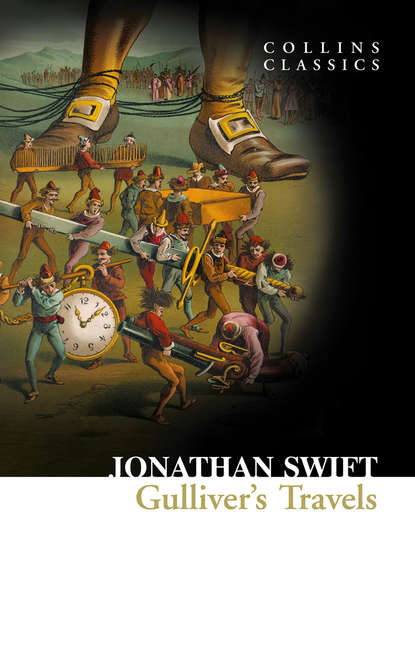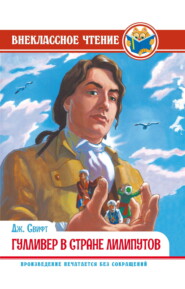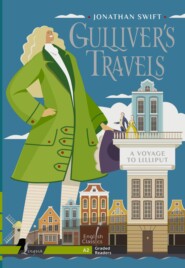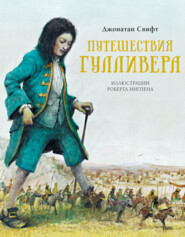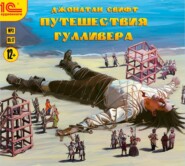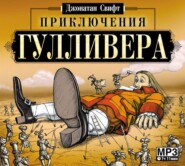По всем вопросам обращайтесь на: info@litportal.ru
(©) 2003-2024.
✖
Gulliver’s Travels
Автор
Год написания книги
2019
Настройки чтения
Размер шрифта
Высота строк
Поля
The emperor and his whole court stood on the shore expecting the issue of this great adventure. They saw the ships move forward in a large half-moon, but could not discern me, who was up to my breast in water. When I advanced to the middle of the channel, they were yet in more pain, because I was under water to my neck. The emperor concluded me to be drowned, and that the enemy’s fleet was approaching in a hostile manner: but he was soon eased of his fears, for the channel growing shallower every step I made, I came in a short time within hearing, and, holding up the end of the cable by which the fleet was fastened, I cried in a loud voice, “Long live the most puissant Emperor of Lilliput!” This great prince received me at my landing with all possible encomiums, and created me a nardac upon the spot, which is the highest title of honour among them.
His Majesty desired I would take some other opportunity of bringing all the rest of his enemy’s ships into his ports. And so unmeasurable is the ambition of princes, that he seemed to think of nothing less than reducing the whole empire of Blefuscu into a province, and governing it by a viceroy; of destroying the Big-endian exiles, and compelling that people to break the smaller end of their eggs, by which he would remain the sole monarch of the whole world. But I endeavoured to divert him from his design, by many arguments drawn from the topics of policy, as well as justice: and I plainly protested, that I would never be an instrument of bringing a free and brave people into slavery. And, when the matter was debated in council, the wisest part of the ministry were of my opinion.
This open, bold declaration of mine was so opposite to the schemes and politics of his Imperial Majesty, that he could never forgive me; he mentioned it in a very artful manner in council, where I was told that some of the wisest appeared, at least by their silence, to be of my opinion; but others, who were my secret enemies, could not forbear some expressions, which by a side-wind reflected on me. And from this time began an intrigue between his Majesty and a junto of ministers maliciously bent against me, which broke out in less than two months, and had like to have ended in my utter destruction. Of so little weight are the greatest services to princes, when put into the balance with a refusal to gratify their passions.
About three weeks after this exploit, there arrived a solemn embassy from Blefuscu, with humble offers of a peace; which was soon concluded upon conditions very advantageous to our emperor, wherewith I shall not trouble the reader. There were six ambassadors, with a train of about five hundred persons, and their entry was very magnificent, suitable to the grandeur of their master, and the importance of their business.
When their treaty was finished, wherein I did them several good offices by the credit I now had or at least appeared to have, at court, their Excellencies, who were privately told how much I had been their friend, made me a visit in form. They began with many compliments upon my valour and generosity, invited me to that kingdom in the emperor their master’s name, and desired me to show them some proofs of my prodigious strength, of which they had heard so many wonders; wherein I readily obliged them, but shall not trouble the reader with the particulars.
When I had for some time entertained their Excellencies to their infinite satisfaction and surprise, I desired they would do me the honour to present my most humble respects to the emperor their master, the renown of whose virtues had so justly filled the whole world with admiration, and whose royal person I resolved to attend before I returned to my own country.
Accordingly, the next time I had the honour to see our emperor, I desired his general licence to wait on the Blefuscudian monarch, which he was pleased to grant me, as I could plainly perceive, in a very cold manner; but could not guess the reason, till I had a whisper from a certain person that Flimnap and Bolgolam had represented my intercourse with those ambassadors as a mark of disaffection, from which, I am sure, my heart was wholly free. And this was the first time I began to conceive some imperfect idea of courts and ministers.
It is to be observed, that these ambassadors spoke to me by an interpreter, the languages of both empires differing as much from each other as any two in Europe, and each nation priding itself upon the antiquity, beauty, and energy of their own tongues, with an avowed contempt for that of their neighbour; yet our emperor, standing upon the advantage he had got by the seizure of their fleet, obliged them to deliver their credentials and make their speech in the Lilliputian tongue. And it must be confessed that, from the great intercourse of trade and commerce between both realms, from the continual reception of exiles, which is mutual among them, and from the custom in each empire to send their young nobility and richer gentry to the other, in order to polish themselves by seeing the world, and understanding men and manners, there are few persons of distinction, or merchants, or seamen, who dwell in the maritime parts, but what can hold conversation in both tongues; as I found some weeks after, when I went to pay my respects to the emperor of Blefuscu, which, in the midst of great misfortunes, through the malice of my enemies, proved a very happy adventure to me, as I shall relate in its proper place.
The reader may remember that, when I signed those articles upon which I recovered my liberty, there were some which I disliked upon account of their being too servile, neither could anything but an extreme necessity have forced me to submit. But, being now a nardac of the highest rank in that empire, such offices were looked upon as below my dignity, and the emperor (to do him justice) never once mentioned them to me.
CHAPTER 6 (#ulink_309f2967-a667-5122-93d3-89affe4ebeee)
Of the inhabitants of Lilliput; their learning, laws, and customs; the manner of educating their children. The author’s way of living in that country. His vindication of a great lady.
Although I intend to leave the description of this empire to a particular treatise, yet, in the meantime, I am content to gratify the curious reader with some general ideas. As the common size of the natives is somewhat under six inches high, so there is an exact proportion in all other animals, as well as plants and trees: for instance, the tallest horses and oxen are between four and five inches in height, the sheep an inch and half, more or less; their geese about the bigness of a sparrow, and so the several gradations downwards, till you come to the smallest, which, to my sight, were almost invisible; but nature hath adapted the eyes of the Lilliputians to all objects proper for their view: they see with great exactness, but at no great distance. And, to show the sharpness of their sight towards objects that are near, I have been much pleased with observing a cook pulling a lark, which was not so large as a common fly, and a young girl threading an invisible needle with invisible silk. Their tallest trees are about seven feet high; I mean some of those in the great royal park, the tops whereof I could but just reach with my fist clenched. The other vegetables are in the same proportion; but this I leave to the reader’s imagination.
I shall say but little at present of their learning, which for many ages hath flourished in all its branches among them: but their manner of writing is very peculiar, being neither from the left to the right, like the Europeans; nor from the right to the left, like the Arabians; nor from up to down, like the Chinese; but aslant from one corner of the paper to the other, like ladies in England.
They bury their dead with their heads directly downwards, because they hold an opinion that in eleven thousand moons they are all to rise again, in which period the earth (which they conceive to be flat) will turn upside down, and by this means they shall, at their resurrection, be found ready standing on their feet. The learned among them confess the absurdity of this doctrine, but the practice still continues, in compliance to the vulgar.
There are some laws and customs in this empire very peculiar; and, if they were not so directly contrary to those of my own dear country, I should be tempted to say a little in their justification. It is only to be wished they were as well executed. The first I shall mention relates to informers. All crimes against the state are punished here with the utmost severity; but, if the person accused maketh his innocence plainly to appear upon his trial, the accuser is immediately put to an ignominious death; and, out of his goods or lands, the innocent person is quadruply recompensed for the loss of his time, for the danger he underwent, for the hardship of his imprisonment, and for all the charges he hath been made at in making his defence, or, if that fund be deficient, it is largely supplied by the crown. The emperor does also confer on him some public mark of his favour, and proclamation is made of his innocence through the whole city.
They look upon fraud as a greater crime than theft, and therefore seldom fail to punish it with death; for they allege that care and vigilance, with a very common understanding, may preserve a man’s goods from thieves, but honesty has no fence against superior cunning; and since it is necessary that there should be a perpetual intercourse of buying and selling, and dealing upon credit, where fraud is permitted and connived at, or hath no law to punish it, the honest dealer is always undone, and the knave gets the advantage. I remember when I was once interceding with the king for a criminal, who had wronged his master of a great sum of money, which he had received by order and ran away with; and happening to tell his Majesty, by way of extenuation, that it was only a breach of trust, the emperor thought it monstrous in me to offer, as a defence, the greatest aggravation of the crime; and truly, I had little to say in return, further than the common answer, that different nations had different customs; for, I confess, I was heartily ashamed.
Although we usually call reward and punishment the two hinges upon which all government turns, yet I could never observe this maxim to be put in practice by any nation except that of Lilliput. Whoever can there bring sufficient proof that he hath strictly observed the laws of his country for seventy-three moons, hath a claim to certain privileges, according to his quality and condition of life, with a proportionable sum of money out of a fund appropriated for that use: he likewise acquires the title of snilpall, or legal, which is added to his name, but does not descend to posterity And these people thought it a prodigious defect of policy among us when I told them that our laws were enforced only by penalties, without any mention of reward. It is upon this account that the image of Justice, in their courts of judicature, is formed with six eyes, two before, as many behind, and on each side one, to signify circumspection; with a bag of gold open in her right hand and a sword sheathed in her left, to show she is more disposed to reward than to punish.
In choosing persons for all employments, they have more regard to good morals that to great abilities; for, since government is necessary to mankind, they believe that the common size of human understanding is fitted to some station or other, and that Providence never intended to make the management of public affairs a mystery, to be comprehended only by a few persons of sublime genius, of which there seldom are three born in an age; but they suppose truth, justice, temperance, and the like, to be in every man’s power, the practice of which virtues, assisted by experience and a good intention, would qualify any man for the service of his country, except where a course of study is required. But they thought the want of moral virtues was so far from being supplied by superior endowments of the mind, that employments could never be put into such dangerous hands as those of persons so qualified; and at least, that the mistakes, committed by ignorance in a virtuous disposition, would never be of such fatal consequence to the public weal as the practices of a man whose inclinations led him to be corrupt, and had great abilities to manage, and multiply, and defend his corruptions.
In like manner the disbelief of a Divine Providence renders a man incapable of holding any public station; for, since kings avow themselves to be the deputies of Providence, the Lilliputians think nothing can be more absurd than for a prince to employ such men as disown the authority under which he acts.
In relating these and the following laws, I would only be understood to mean the original institutions, and not the most scandalous corruptions into which these people are fallen, by the degenerate nature of man. For, as to that infamous practice of acquiring great employments by dancing on the ropes, or badges of favour and distinction by leaping over sticks and creeping under them, the reader is to observe that they were first introduced by the grandfather of the emperor now reigning, and grew to the present height by the gradual increase of party and faction.
Ingratitude is, among them, a capital crime, as we read it to have been in some other countries; for they reason thus, that whoever makes ill returns to his benefactor, must needs be a common enemy to the rest of mankind, from whom he hath received no obligation and therefore such a man is not fit to live.
Their notions relating to the duties of parents and children differ extremely from ours. They will never allow that a child is under any obligation to his father or to his mother for bringing him into the world, which, considering the miseries of human life, was not a benefit in itself. Upon these, and the like reasonings, their opinion is, that parents are the last of all others to be trusted with the education of their own children; and therefore they have in every town public nurseries, where all parents, except cottagers and labourers, are obliged to send their infants of both sexes to be reared and educated when they come to the age of twenty moons, at which time they are supposed to have some rudiments of docility. These schools are of several kinds suited to different qualities, and to both sexes. They have certain professors well skilled in preparing children for such a condition of life as befits the rank of their parents, and their own capacities as well as inclinations. I shall first say something of the male nurseries, and then of the female.
The nurseries for males of noble or eminent birth are provided with grave and learned professors, and their several deputies. The clothes and food of the children are plain and simple. They are bred up in the principles of honour, justice, courage, clemency, religion, and love of their country; they are always employed in some business, except in the times of eating and sleeping, which are very short, and two hours for diversions, consisting of bodily exercises. They are dressed by men till four years of age, and then obliged to dress themselves, although their quality be ever so great; and the women attendants, who are aged proportionably to ours at fifty, perform only the most menial offices. They are never suffered to converse with servants, but go together in smaller and greater numbers to take their diversions, and always in the presence of a professor, or one of his deputies; whereby they avoid those early bad impressions of folly and vice to which our children are subject. Their parents are suffered to see them only twice a year; the visit is to last but an hour; they are allowed to kiss the child at meeting and parting; but a professor, who always stands by on those occasions, will not suffer them to whisper, or use any fondling expressions, or bring any presents of toys, sweetmeats, and the like.
The pension from each family for the education and entertainment of a child, upon failure of due payment, is levied by the emperor’s officers.
The nurseries for children of ordinary gentlemen, merchants, traders, and handicrafts, are managed proportionably after the same manner; only those designed for trades are put out apprentices at eleven years old, whereas those of persons of quality continue in their exercises till fifteen, which answers to twenty-one with us; but the confinement is gradually lessened for the last three years.
In the female nurseries, the young girls of quality are educated much like the males, only they are dressed by orderly servants of their own sex; but always in the presence of a professor or deputy, till they come to dress themselves, which is at five years old. And if it be found that these nurses ever presume to entertain the girls with frightful or foolish stories, or the common follies practised by chamber-maids among us, they are publicly whipped thrice about the city, imprisoned for a year, and banished for life to the most desolate part of the country. Thus the young ladies there are as much ashamed of being cowards and fools as the men, and despise all personal ornaments beyond decency and cleanliness: neither did I perceive any difference in their education made by their difference of sex, only that the exercises of the females were not altogether so robust; and that some rules were given them relating to domestic life, and a smaller compass of learning was enjoined them; for their maxim is that, among people of quality, a wife should be always a reasonable and agreeable companion, because she cannot always be young. When the girls are twelve years old, which among them is a marriageable age, their parents or guardians take them home with great expressions of gratitude to the professors, and seldom without tears of the young lady and her companions.
In the nurseries of the females of the meaner sort, the children are instructed in all kinds of works proper for their sex and their several degrees: those intended for apprentices are dismissed at seven years old, the rest are kept to eleven.
The meaner families, who have children at these nurseries, are obliged, besides their annual pension, which is as low as possible, to return to the steward of the nursery a small monthly share of their gettings, to be a portion for the child; and therefore all parents are limited in their expenses by the law. For the Lilliputians think nothing can be more unjust than for people, in subservience to their own appetites, to bring children into the world, and leave the burthen of supporting them on the public. As to persons of quality, they give security to appropriate a certain sum for each child, suitable to their condition; and these funds are always managed with good husbandry, and the most exact justice.
The cottagers and labourers keep their children at home, their business being only to till and cultivate the earth, and therefore their education is of little consequence to the public: but the old and diseased among them are supported by hospitals; for begging is a trade unknown in this empire.
And here it may, perhaps, divert the curious reader to give some account of my domestics, and my manner of living in this country, during a residence of nine months and thirteen days. Having a head mechanically turned, and being likewise forced by necessity, I had made for myself a table and chair convenient enough, out of the largest trees in the royal park. Two hundred sempstresses were employed to make me shirts, and linen for bed and table, all of the strongest and coarsest kind they could get; which, however, they were forced to quilt together in several folds, for the thickest was some degrees finer than lawn. Their linen is usually three inches wide, and three feet make a piece. The sempstresses took my measure as I lay on the ground, one standing at my neck, and another at my knee, with a strong cord extended, that each held by the end, while the third measured the length of the cord with a rule of an inch long. Then they measured my right thumb and desired no more; for, by a mathematical computation, that twice round the thumb is once round the wrist, and so on to the neck and the waist, and by the help of my old shirt, which I displayed on the ground before them for a pattern, they fitted me exactly.
Three hundred tailors were employed in the same manner to make me clothes; but they had another contrivance for taking my measure. I kneeled down and they raised a ladder from the ground to my neck; upon this ladder one of them mounted, and let fall a plumb-line from my collar to the floor, which just answered the length of my coat; but my waist and arms I measured myself. When my clothes were finished, which was done in my house (for the largest of theirs would not have been able to hold them) they looked like the patch-work made by the ladies in England, only that mine were all of a colour.
I had three hundred cooks to dress my victuals, in little convenient huts built about my house, where they and their families lived, and prepared me two dishes a-piece. I took up twenty waiters in my hand, and placed them on the table; a hundred more attended below on the ground, some with dishes of meat, and some with barrels of wine and other liquors, slung on their shoulders, all of which the waiters above drew up as I wanted, in a very ingenious manner, by certain cords, as we draw the bucket up a well in Europe. A dish of their meat was a good mouthful, and a barrel of their liquor a reasonable draught. Their mutton yields to ours, but their beef is excellent. I have had a surloin so large that I have been forced to make three bites of it; but this is rare. My servants were astonished to see me eat it, bones and all, as in our country we do the leg of a lark. Their geese and turkeys I usually eat at a mouthful; and I must confess they far exceed ours. Of their smaller fowl, I could take up twenty or thirty at the end of my knife.
One day his Imperial Majesty, being informed of my way of living, desired that himself and his royal consort, with the young princes of the blood of both sexes, might have the happiness (as he was pleased to call it) of dining with me. They came accordingly, and I placed them upon chairs of state upon my table, just over against me, with their guards about them. Flimnap, the lord high treasurer, attended there likewise, with his white staff; and I observed he often looked on me with a sour countenance, which I would not seem to regard, but ate more than usual, in honour to my dear country, as well as to fill the court with admiration. I have some private reasons to believe that this visit from his Majesty gave Flimnap an opportunity of doing me ill offices to his master. That minister had always been my secret enemy, though he outwardly caressed me more than was usual to the moroseness of his nature. He represented to the emperor the low condition of his treasury; that he was forced to take up money at great discount; that exchequer bills would not circulate under nine per cent. below par; that, in short, I had cost his Majesty above a million and a half of sprugs (their greatest gold coin, about the bigness of a spangle); and, upon the whole, that it would be advisable in the emperor to take the first fair occasion of dismissing me.
I am here obliged to vindicate the reputation of an excellent lady, who was an innocent sufferer upon my account. The treasurer took a fancy to be jealous of his wife, from the malice of some evil tongues, who informed him that her Grace had taken a violent affection for my person; and the court scandal ran for some time, that she once came privately to my lodging. This I solemnly declared to be a most infamous falsehood, without any grounds, further than that her Grace was pleased to treat me with all innocent marks of freedom and friendship.
I own she came often to my house, but always publicly, nor ever without three more in the coach, who were usually her sister and young daughter and some particular acquaintance; but this was common to many other ladies of the court. And I still appeal to my servants round, whether they at any time saw a coach at my door, without knowing what persons were in it. On those occasions, when a servant had given me notice, my custom was to go immediately to the door; and after paying my respects, to take up the coach and two horses very carefully in my hands (for, if there were six horses, the postilion always unharnessed four) and place them on a table, where I had fixed a movable rim quite round, of five inches high, to prevent accidents. And I have often had four coaches and horses at once on my table full of company, while I sat in my chair, leaning my face towards them; and, when I was engaged with one set, the coachman would gently drive the others round my table. I have passed many an afternoon very agreeably in these conversations. But I defy the treasurer, or his two informers (I will name them, and let them make their best of it), Clustril and Drunlo, to prove that any person ever came to me incognito, except the secretary Reldresal, who was sent by express command of his Imperial Majesty, as I have before related.
I should not have dwelt so long upon this particular, if it had not been a point wherein the reputation of a great lady is so nearly concerned, to say nothing of my own; though I then had the honour to be a nardac, which the treasurer himself is not; for all the world knows that he is only a glumglum, a title inferior by one degree, as that of a marquis is to a duke in England, although I allow he preceded me in right of his post. These false informations, which I afterwards came to the knowledge of by an accident not proper to mention, made Flimnap, the treasurer, show his lady, for some time, an ill countenance, and made me a worse; and although he were at last undeceived and reconciled to her, yet I lost all credit with him, and found my interest decline very fast with the emperor himself, who was, indeed, too much governed by that favourite.
CHAPTER 7 (#ulink_94cea5df-677f-5e06-9311-e9fba4158229)
The author, being informed of a design to accuse him of high treason, makes his escape to Blefuscu. His reception there.
Before I proceed to give an account of my leaving this kingdom, it may be proper to inform the reader of a private intrigue which had been for two months forming against me.
I had been hitherto all my life a stranger to courts, for which I was unqualified by the meanness of my condition. I had, indeed, heard and read enough of the dispositions of great princes and ministers; but never expected to have found such terrible effects of them in so remote a country, governed, as I thought, by very different maxims from those in Europe.
When I was just preparing to pay my attendance on the Emperor of Blefuscu, a considerable person at court (to whom I had been very serviceable at a time when he lay under the highest displeasure of his Imperial Majesty), came to my house very privately at night in a close chair, and, without sending his name, desired admittance. The chairmen were dismissed; I put the chair, with his lordship in it, into my coat pocket; and, giving orders to a trusty servant to say I was indisposed and gone to sleep, I fastened the door of my house, placed the chair on the table, according to my usual custom, and sat down by it. After the common salutations were over, observing his lordship’s countenance full of concern, and inquiring into the reason, he desired I would hear him with patience, in a matter that highly concerned my honour and my life. His speech was to the following effect, for I took notes of it as soon as he left me.
“You are to know,” said he, “that several committees of council have been lately called in the most private manner on your account; and it is but two days since his Majesty came to a full resolution.
“You are very sensible that Skyresh Bolgolam (galbet, or high admiral) hath been your mortal enemy almost ever since your arrival: his original reasons I know not; but his hatred is increased since your great success against Blefuscu, by which his glory, as admiral, is much obscured. This lord, in conjunction with Flimnap, the high treasurer, whose enmity against you is notorious on account of his lady, Limtoc the general, Lalcon the chamberlain, and Balmuff the grand justiciary, have prepared articles of impeachment against you, for treason and other capital crimes.”
This preface made me so impatient, being conscious of my own merits and innocence, that I was going to interrupt; when he entreated me to be silent, and thus proceeded,—
“Out of gratitude for the favours you have done me, I procured information of the whole proceedings, and a copy of the articles, wherein I venture my head for your service.”
“Articles of Impeachment against QUINBUS BLESTRIN (the MAN-MOUNTAIN).
“ARTICLE I
“That the said Quinbus Flestrin having brought the imperial fleet of Blefuscu into the royal port, and being afterwards commanded by his Imperial Majesty to seize all the other ships of the said empire of Blefuscu, and reduce that empire to a province, to be governed by a viceroy from hence, and to destroy and put to death not only all the Big-endian exiles, but likewise all the people of that empire, who would not immediately forsake the Big-endian heresy: he, the said Flestrin, like a false traitor against his most auspicious, serene, Imperial Majesty, did petition to be excused from the said service, upon pretence of unwillingness to force the consciences, or destroy the liberties and lives of innocent people.
“ARTICLE II
“That, whereas certain ambassadors arrived from the court of Blefuscu, to sue for peace in his Majesty’s court: he, the said Flestrin, did, like a false traitor, aid, abet, comfort, and divert the said ambassadors, although he knew them to be servants to a prince who was lately an open enemy to his Imperial Majesty, and in open war against his said Majesty.





